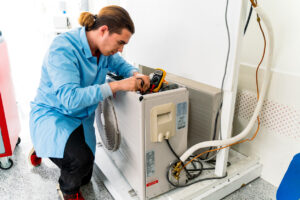Like most people, you probably aren’t thinking much about your HVAC system- until it stops working! When this does happen, you have no choice but to address the issue. So what should you do?
You call an HVAC professional to take a look at it, and you are given some estimates to make the repairs. After some time, you are left wondering if it might be more cost-effective to replace the system. After all, one failure is bad enough, and it doesn’t feel right to be at the whims of a temperamental machine. This is not an easy decision to make, so here are some important things to consider to help you with this process.
Age of Equipment
- The average life expectancy of a furnace is 15-20 years, and 10-12 for an air conditioner or heat pump. If your unit is getting close to its “expiration date,” it’s time to consider replacement as it’s a good chance that more repairs will be needed very soon.
Consider the 50% rule: When the cost of repairs approaches 50% of the value of your heating or cooling system, it’s time to replace the system*.
Consider Efficiency
- Older units are far less efficient than today’s systems. For example, upgrading from an 8-10 SEER cooling system to an 18 SEER will provide substantial savings on your monthly utility bills.
Aging furnaces only have a 68% AFUE, while a new furnace is clocking in at 95% efficiency.
Financing & Incentives
- While you are often left to foot the bill for repairing your old AC or furnace, there are often financial benefits to replacing your system.
- Be sure to ask your dealer for any incentives or financing options that are currently available.
- Search for incentives for upgrading to a new system here: www.dsireusa.org.
Home Improvements
If you have recently upgraded your windows, insulation, roofing or any other energy-efficient upgrades, your current system may not be sized correctly. Conversely, your current unit might be too small if you have added additions to your home:
- An oversized unit costs more to run and uses more energy.
- A smaller-than-needed unit is at risk of not running efficiently, if it’s being kept on constantly and overworking to keep your home comfortable.
Research shows that water heating, air conditioning, and home heating account for more than 50% of domestic energy use*.
The Environment
Modern equipment uses less natural resources and reduces your carbon footprint. Research shows that air conditioning, heating, and water heating account for more than 50% of domestic energy use*.
- Your old system may be using an outdated R-22 refrigerant, which is harmful to the environment. Freon has been banned by the EPA, and by 2020 it will be nonexistent. New systems use the environmentally friendly R-410A refrigerant.
- Choose a new system based on Energy Star ratings to lower your carbon footprint.
- *U.S. Department of Energy Statistics
Home Comfort
Is your home comfortable? Do you have hot rooms, cold rooms, is the air too humid or dry? Your aging HVAC system may be responsible for all of that, and even poor air quality. Not to mention that older systems are louder as well:
- Modern heating and cooling systems can be integrated with programmable thermostats, as well as home automation systems, so you can enjoy home comfort convenience.
When you are faced with the choice to repair the existing equipment or invest in a new unit, be sure to consider the following carefully:
- Life expectancy
- Efficiency
- The environment
- Comfort and convenience
- Incentives and rebates
Don’t be pressured into making a snap decision.
To help you weigh your options and make a decision that is best for your home and budget, we put together this ebook to learn more about life expectancy, refrigerant efficiency, and the current condition of the comfort system in your home. Our ebook also includes an easy DIY assessment you complete at home.
Download our ebook and use our replacement versus repair scorecard to help you decide what is best for you!
 SEE OUR SPECIALS
SEE OUR SPECIALS





 SCHEDULE SERVICE
SCHEDULE SERVICE Call 703-884-2376
Call 703-884-2376


